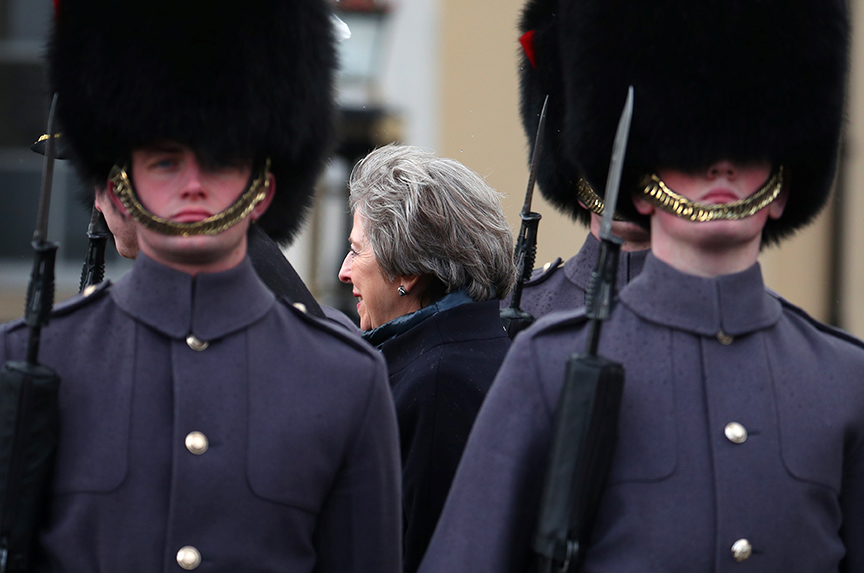BRUSSELS – What kind of defense and security relationship will the United Kingdom have with the European Union (EU) after Brexit becomes fact on March 29, 2019? The range of options for both sides—and the political will to move in that direction coming from the UK—will depend almost wholly on what kind of Brexit London finally chooses.
A first indication of British political will should come before Christmas when the country’s Parliament votes on whether to accept or reject British Prime Minister Theresa May’s Brexit deal with Brussels.
If Westminster accepts the deal then the conditions will be set for an orderly exit of the UK from the EU and a close trading relationship with it.
If it rejects the deal, then May’s political position becomes unviable, the EU will not reopen the package to substantial revisions (there’s not enough time left for that anyway) and the UK heads for a so-called hard Brexit where its economic, trade, and regulatory relations with the EU fall off a cliff.
London has been clear since the UK’s June 2016 referendum rejected EU membership that it wants a close security and defense relationship with Brussels. That means participation in EU missions, cooperation with the European Defense Agency and, it is fervently hoped by British industry, a continued participation in the pan-European defense programs.
However, there has been great reluctance on both sides to talk about the details of this for two reasons. One is that all wait to see if Parliament opts for May’s Brexit package or not. The second reason links directly to the other, less publicized half of Brexit talks: how the two sides intend to frame their future political relationship.
That future relationship, however, will hang on what kind of political atmosphere prevails in London—and that, of course, will rise out of the aftermath of Parliament’s vote in December. In brief, everything interlaces with everything else, like a pile of pick-up sticks. Or, perhaps more fittingly, a viper poisoning its own tail.
So what does this mean for EU-UK security and defense relations?
Let’s look at the worst case first.
If there is a hard Brexit, that means the UK falls immediately out of the EU’s complex array of homeland security laws and cooperative mechanisms among its member states: the sharing of intelligence, police files, judicial evidence, common visa and customs databases, and so on. That will be bad news for London, and for the continent since it gets a lot of useful intelligence from British authorities.
A hard Brexit would also make the UK’s hoped-for defense relationship with the EU more problematic.
If the UK wants, as it avows, close relations with the EDA to participate in its R&D projects and other initiatives, it would need a relationship similar to that which non-EU Norway has with the agency by paying into the EDA’s budget. Norway also pays buckets of money into the EU’s massive Horizon 2020 research budget to enable its companies to participate in EU projects and receive grants. Would a post-hard Brexit UK be willing to do that? Not likely.
Another example involves the EU’s forthcoming €13.5 billion European Defense Fund (EDF). Ironically, the other EU countries are expected to reach agreement around the same time as the Westminster Brexit vote on the conditions under which third countries (read: the UK, the United States and, arguably, Israel) could participate in EDF-funded permanent structured cooperation, or PESCO, projects.
British industry desperately wants access to the EDF’s subsidies for R&D projects and, within the PESCO framework, for defense capability testing and demonstration activities. It will not get that unless London pays into these funds, an idea loathed by Brexiteers.
This is a very problematic issue for London, as it has some of Europe’s biggest defense companies that stand to lose out if those rules are too restrictive. But even if the rules are not, one has to wonder how much political maneuver to “play” with Brussels there will be if there is a hard Brexit.
Indeed, the political atmosphere in London will either be absolutely toxic or panic-stricken if the UK falls off that cliff. Toxicity could drive it to seek its main defense ties to the United States, Australia and others. Panic could drive it, more reasonably, to maintain the status quo as an active member of NATO combined with a far more accommodating stance toward Europe’s defense ambitions. Until June 2016, the UK acted only as a crowbar-in-the-spokes on matters of EU defense, blocking wherever it could. That won’t fly in Brussels anymore.
On the other hand, if Westminster accepts the deal and there is a soft Brexit, the two sides will have far more time to ease the UK out of those security arrangements where necessary, easing it back in over time as deemed fit by London and pursuing those closer ties with the EU in defense.
For the future not only of the UK and the EU, but also for stable transatlantic relations, we should keep all our fingers and toes crossed that reason will prevail when that Brexit package is put to a vote by Westminster’s parliamentarians.
The future generations of the UK deserve a better Christmas package this year than leaping off a cliff edge.
Brooks Tigner reports on EU and NATO foreign, defense, and security policy from Brussels, where he has separated reality from rhetoric for the past twenty-five years.
Image: British Prime Minister Theresa May inspected the troops at Sandhurst Military Academy in Sandhurst, Britain, on January 18. (Reuters/Hannah McKay)

